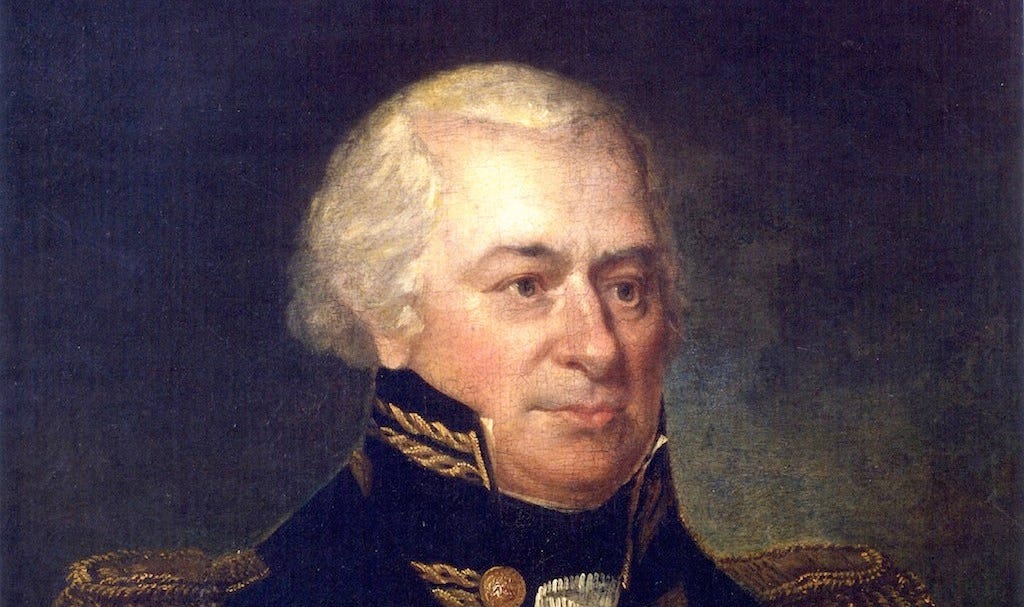For years there were rumors that the powerful American official was on the payroll of a foreign country. Or that he had investments in that foreign country he wanted to protect. Or that for some other reason he wanted to ingratiate himself to the leader of that country, which was consistently at odds with the United States. There seemed no better explanation for his actions.
Yet no one could find the paper trail. No one could document the allegations. Every official inquiry met a dead end. Or a stone wall.
And then, decades after he died, the evidence appeared. A change of government in the foreign country allowed perusal of its records. These included proof that the powerful American had indeed been on its payroll.
James Wilkinson was born in Maryland amid the French and Indian War. He came of age in the Revolutionary War. He was talented and ambitious, making brigadier general before his 21st birthday. Yet his rapid rise and his penchant for complaining about his superiors caused tongues to wag. What was his game?
At war's end he moved to Kentucky, as the trans-Appalachian counties of Virginia were then called. He became active in a political movement demanding that Kentucky be made a separate state. Central to his argument was that the rivers on the western side of the mountains flowed to the Mississippi and the Gulf of Mexico. In that direction — not to the east and old Virginia — lay Kentucky's future.
To underscore his point he traveled to New Orleans and met with the governor of Spanish Louisiana, which included the lower portion of the Mississippi River. Wilkinson explained to Esteban Rodríguez Miró that a close connection between Louisiana and Kentucky would conduce to the prosperity of both. He hinted that once Kentucky broke free of Virginia and became a sovereign state — as sovereign as each of the other states under the Articles of Confederation — it might form an alliance with Spanish Louisiana. It might even annex itself to Louisiana.
Wilkinson indicated that his efforts on behalf of Spain would be facilitated by a regular stipend. Seven thousand dollars would suffice. To demonstrate his seriousness, he wrote a long report describing the restiveness of the Kentuckians under American rule and their desire to become subjects of the Spanish crown, with guaranteed access to the Mississippi and the Gulf.
Miró encrypted Wilkinson's report and sent it to Spain. Wilkinson was labeled “Agent 13.” Miró commenced payment of Wilkinson's stipend.
During the next two decades, relations between America and Spain were fraught. America was a rising power and Spain a declining one. They shared a long border: the lower Mississippi and an east-west line at the northern frontier of East and West Florida, stretching from the Atlantic to the Mississippi. Trade issues, centered on New Orleans were a chronic problem. Would Spain allow American exporters to use the docks and warehouses at the city? At what price? Florida was a haven for escaped slaves from American plantations in the deep South. Would Spain assist in their capture and return? Would Spain allow Americans to pursue the fugitives into Spanish territory?
During all this, Wilkinson provided intelligence to his Spanish paymasters. Perhaps he thought he was doing a service for both sides by preventing war, which often loomed but never quite broke out. Maybe he just liked the money.
The energy he devoted to Spain didn’t prevent his ascent through the American ranks. He became the army’s senior officer, serving in that position under three presidents. After Napoleon strong-armed Spain into returning Louisiana to France and then sold it to America, Wilkinson was appointed governor of Louisiana Territory. He subsequently served as American envoy to Spanish Mexico. He died in independent Mexico in 1825.
Powerful people have critics, and Wilkinson’s critics recurrently suggested he seemed inordinately sympathetic to Spain. When Aaron Burr was prosecuted for treason in allegedly trying to split part of the American southwest from the United States, some Wilkinson correspondence with Burr came to light that fed the suspicions. But Wilkinson always managed to stay a step ahead of the distrusters.
The true nature of his Spanish connection remained hidden until the 1850s, when Charles Gayarré, researching the history of Louisiana, found letters and reports from Wilkinson in government archives in Spain. Gayarré also found letters from Miró to the Spanish crown explaining that he was paying Wilkinson and stressing the importance of “el tener contento al dicho Brigadier” — “keeping the General happy.”
Gayarré characterized Wilkinson’s Spanish connection as a “chain of infamy.” Later historians were no more forgiving. Theodore Roosevelt declared of Wilkinson, “In all our history there is no more despicable character.”
Sometimes rumors are just rumors. Sometimes they turn out to be true.




What a timely story that could possibly parallel a certain powerful individual. I guess only time will tell…..
The clear parallel now is the current occupant of the Oval Office!
Individual Russians have invested heavily in Trump properties, and, following Trump's bankruptcies in the 1990s, he borrowed money from Russian sources. Both Donald Trump Jr. and Eric Trump have said that Russia was an important source of money for the Trump businesses.